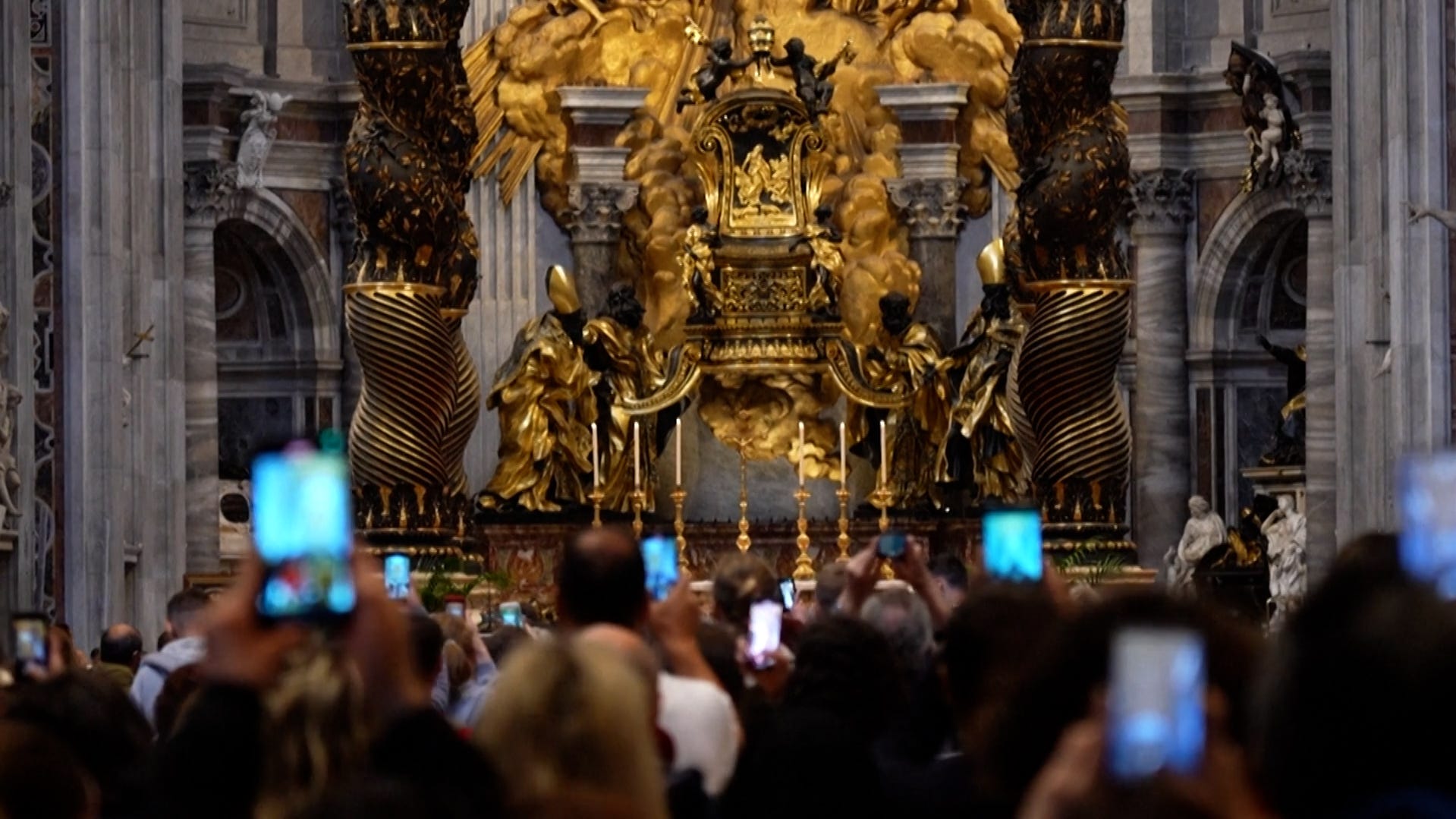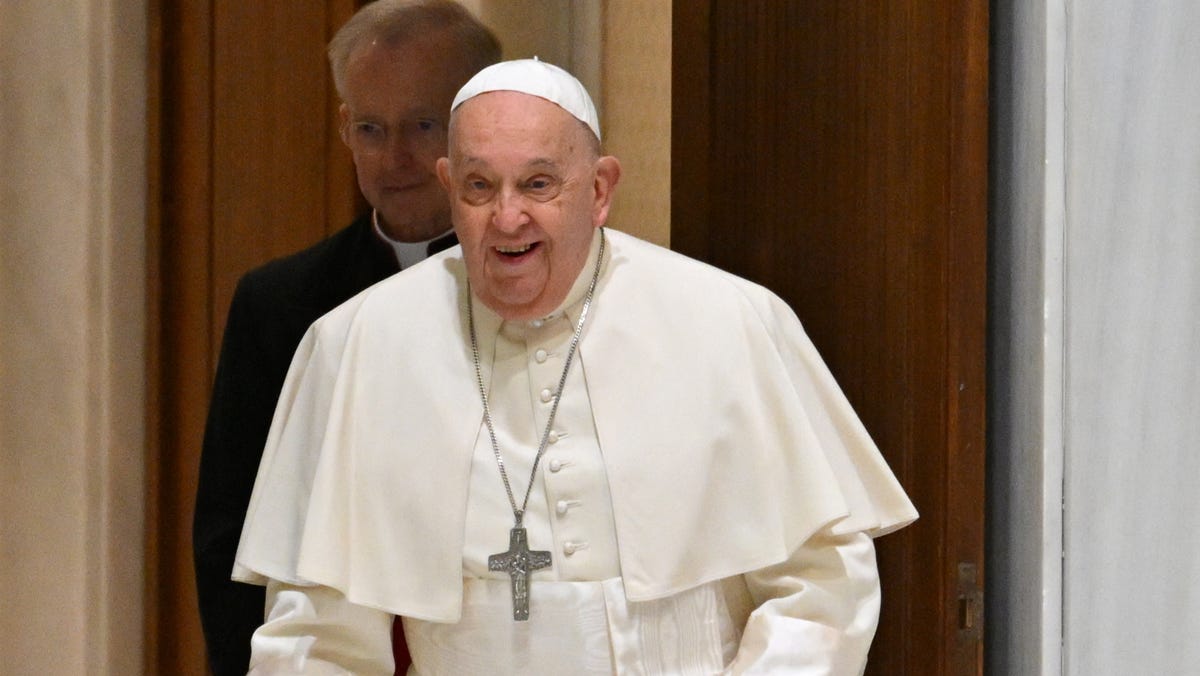Pope Francis’ reforms led to increased visibility and acceptance of LGBTQ+ people within and beyond Catholicism. As we mourn his passing, there is anxiety about whether this progress will be reversed.

What to expect at the funeral of Pope Francis
Pope Francis will be the first pope in more than a century to be buried outside of the Vatican.
After the death of Pope Francis on April 21, DignityUSA held a community gathering that night where LGBTQ+ Catholics, our family members, friends and allies could share their grief, hopes and fears. There were moving stories about how moments from Francis’ ministry touched individual hearts, and how even glimpses of him during his visit to the United States moved people to tears. Some shared quotes from his writings.
Andrés Merino-Restrepo, a bisexual man from Colombia now living in Canada said, “It always felt as if we had a room in the pope’s heart.” Others spoke of their fear that the next pope might undo the progress made toward greater acceptance of LGBTQ+ Catholics in our church.
The outpouring of emotion in this quickly organized event testifies to the unprecedented connection between the LGBTQ+ Catholic community and Francis. During his 12 years as leader of the world’s largest Christian denomination, Francis spoke about, met with, embraced and issued policies that supported LGBTQ+ people in ways that were unimaginable before his papacy.
Pope Francis treated LGBTQ+ people with humanity. Will the next pope do the same?
He used the words “gay” and “transgender,” rather than the more clinical or dehumanizing terms common to his predecessors. He met with LGBTQ+ people on many occasions, sending pictures from these meetings across the world. He famously placed transgender people under the Vatican’s care during the COVID-19 pandemic. He allowed priests to bless same-sex couples and opened baptism and the role of godparent to transgender people.
The impact of these and other departures from tradition cannot be underestimated.
Further, when Francis called for a worldwide synod of the Catholic Church, he acknowledged that the church had wounded and excluded many – impoverished people, people with disabilities, addicts and LGBTQ+ people among them.
Unlike past synods, which involved only bishops, he called for the voices of those the church had failed to be included in listening sessions held in every diocese worldwide.
Many LGBTQ+ people, family members and others spoke about the gifts that LGBTQ+ people brought to the church and the many types of discrimination they had experienced within it. And while the LGBTQ+ community was not named explicitly in the synod’s final report, these testimonies were included in documents that are now part of the permanent record of our church.
Due to Francis’ willingness to allow open discussion of controversial issues, LGBTQ-positive Catholic theologians felt freer to speak and to publish. He supported priests, bishops and colleges that initiated LGBTQ+ ministries and had close friendships with LGBTQ+ people.
All of this led to increased visibility and acceptance of LGBTQ+ people within and beyond Catholic institutions.
Even as we and our allies continue to mourn Francis’ passing, there is anxiety about whether this affirming trajectory will be halted or even reversed. The concern is understandable.
Will the Catholic Church turn its back on LGBTQ+ community?
In many parts of the world, as well as in some U.S. communities, church officials and political leaders remain vocal proponents of the belief that living as gay or transgender is incompatible with God’s plan for humanity. They lead or support efforts to restrict human rights of LGBTQ+ people, enforce celibacy for gays and lesbians, deny gender-affirming care to transgender and nonbinary individuals, allow the practice of conversion therapy and even criminalize people based on their identity or relationships.
Will the next pope support these harmful positions? Will he roll back the hard-won, if still incomplete, acceptance many LGBTQ+ Catholics have come to expect from our church?
I think not. The simplest hope I can offer anxious people is numeric.
Francis appointed more than 80% of the cardinals who will elect his successor. While it is true that his appointments were driven less by ideology than by ensuring more geographic diversity in church leadership, he also tended to select men who were known as good pastors.
These are people who should prioritize caring for human needs over adherence to less inclusive church practices as they consider the direction a new pope may lead the church.
More important, perhaps, Francis inspired a greater sense of ownership of the church among regular believers. Through the global synod called to shape our church’s future, millions of people shared their experiences of Catholicism, their struggles to remain in the church and their hopes for change.
Thousands of pages document these testimonies in reports from all around the world. I hope that the cardinal electors reflect on and pray over what Catholics want our church to be. If this happens, I am confident that our new pope will also be a shepherd and a clear moral voice in a troubled world.
No matter who is chosen to guide the Catholic Church in the years ahead, LGBTQ+ Catholics and those who love us have been empowered. We will continue to work toward full inclusion in our church and our world ‒ and for recognition that we are no more and no less than who we were created to be by a loving God.
Marianne Duddy-Burke is executive director of DignityUSA and co-chair of the Global Network of Rainbow Catholics. She has served in leadership positions in the Catholic LGBTQ+ movement since 1985.
